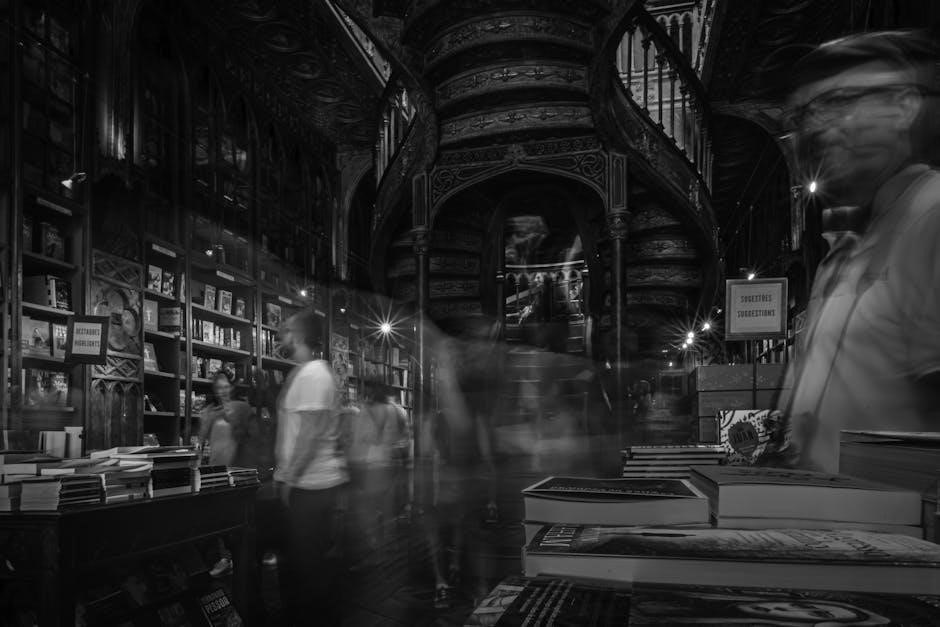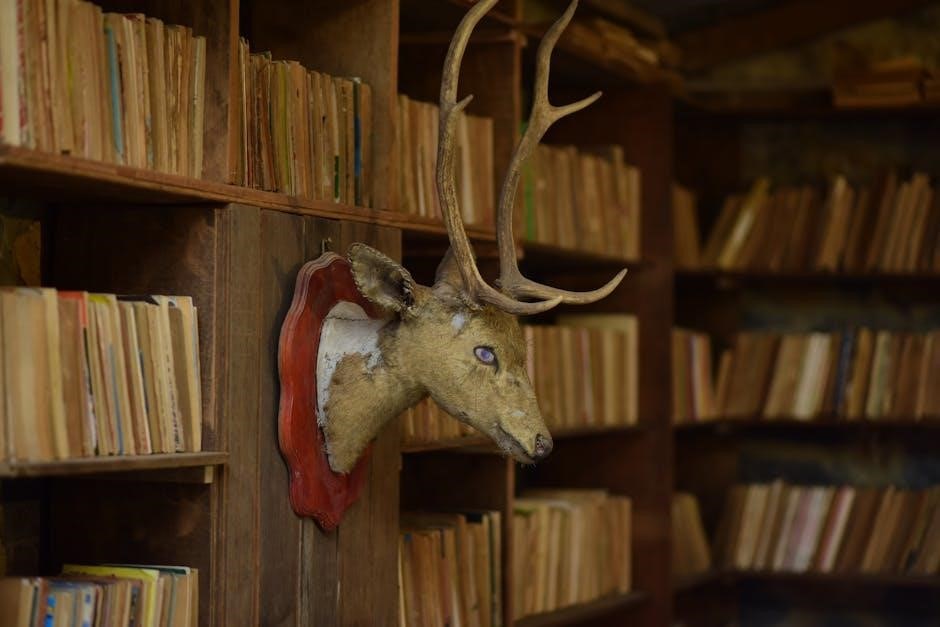Demonology, the study of demons and their influence, offers insights into theology, folklore, and occult practices. Its significance lies in understanding spiritual forces, moral duality, and supernatural phenomena, making it a fascinating and accessible field through free PDF resources.
What is Demonology?
Demonology is the systematic study of demons, their nature, origins, and interactions with humans. It explores theological, cultural, and supernatural aspects, often delving into folklore, religious texts, and occult practices. This field examines the role of demonic entities in various belief systems, addressing their classifications, behaviors, and alleged influences on humanity. Historical texts like Daemonologie by King James I and modern works such as The Encyclopedia of Demons and Demonology by Michelle Belanger provide comprehensive insights. Demonology also touches on rituals, spiritual warfare, and the ethical implications of engaging with such beings. Whether approached from a religious or academic perspective, it remains a fascinating and complex subject, offering deep dives into the mysteries of the supernatural.

Historical and Cultural Relevance of Demonology
Demonology has deep historical and cultural roots, shaping societal fears, religious practices, and supernatural beliefs. It emerged in ancient civilizations, with texts like Daemonologie by King James I and Demonology and Devil-lore by Moncure Daniel Conway providing foundational insights. These works influenced witch hunts and trials, reflecting the era’s spiritual anxieties. Across cultures, demonology appears in Jewish mysticism, Islamic theology, and medieval Christianity, highlighting its universal relevance. It explores the nature of evil, moral duality, and humanity’s struggle with the unknown. Historical texts like Letters on Demonology and Witchcraft by Walter Scott offer a bridge between folklore and academia. Today, free PDF resources make these works accessible, preserving their cultural significance and allowing modern exploration of this timeless subject.
Key Historical Texts on Demonology
Key historical texts on demonology include Daemonologie by King James I, Letters on Demonology and Witchcraft by Walter Scott, and Demonology and Devil-lore by Moncure Daniel Conway. These foundational works, available as free PDFs, offer profound insights into the subject’s evolution and cultural impact.

Daemonologie by King James I
Daemonologie, written by King James I in 1597, is a foundational text in demonology, exploring witchcraft, demonic powers, and spiritual warfare. This treatise, divided into three books, delves into the nature of demons, their interactions with humans, and the dangers of witchcraft. It reflects the era’s theological and cultural beliefs, offering a detailed analysis of demonology’s role in society. The book’s historical significance lies in its influence on witch trials and its contribution to the intellectual discourse of the time. Available as a free PDF, Daemonologie remains a crucial resource for understanding early modern perspectives on demons and the supernatural, providing insights into the intersection of religion, law, and folklore during the late Renaissance period.

Letters on Demonology and Witchcraft by Walter Scott
Letters on Demonology and Witchcraft, authored by Sir Walter Scott in 1830, is a captivating exploration of supernatural beliefs, folklore, and witchcraft. This collection of letters examines the historical and cultural context of demonology, offering insights into the societal fears and superstitions of past centuries. Scott approaches the subject with a mix of skepticism and respect for tradition, delving into tales of witch trials, demonic encounters, and mystical practices. The book serves as a bridge between antiquarianism and modern thought, providing a comprehensive overview of how demonology has shaped human understanding of the unknown. Available as a free PDF, this work remains a valuable resource for scholars and enthusiasts alike, blending historical analysis with engaging narrative to illuminate the enduring fascination with demons and the supernatural.
Demonology and Devil-lore by Moncure Daniel Conway
Demonology and Devil-lore, written by Moncure Daniel Conway, is a seminal work that delves into the comparative study of demonology across various cultures and historical periods. Conway, an American scholar and theologian, explores the evolution of demonic myths, tracing their roots in ancient religions and folklore. The book examines how different societies have conceptualized evil spirits, their roles in religious systems, and their impact on human culture. Conway’s approach is both analytical and descriptive, offering a rich tapestry of beliefs and practices. His work bridges theology, anthropology, and history, making it a valuable resource for understanding the complexities of demonology. Available as a free PDF, this text remains a cornerstone for scholars and enthusiasts seeking to explore the multifaceted nature of demonic lore and its enduring influence on human thought and belief systems.
Modern Perspectives on Demonology
Modern demonology explores contemporary interpretations of demonic lore, blending traditional beliefs with new-age practices. Books like the Encyclopedia of Demons and Demonology and The Handbook of Demonolatry offer fresh insights into rituals, magick, and cultural significance, making demonology accessible to modern readers.
Encyclopedia of Demons and Demonology
The Encyclopedia of Demons and Demonology is a seminal work that delves into the intricate world of demonic lore, offering a comprehensive guide to myths, legends, and practices. This extensive resource covers a wide range of topics, including the origins of demons, their roles in various cultures, and their significance in religious and occult traditions. It features detailed entries on prominent demons, their hierarchies, and the rituals associated with them. The book also explores modern interpretations of demonology, making it a valuable resource for both scholars and enthusiasts. With its rich historical context and practical insights, the Encyclopedia of Demons and Demonology provides a fascinating exploration of the supernatural and its impact on human belief systems. Its availability in PDF format has made it accessible to a global audience, further enhancing its educational and cultural significance.

The Handbook of Demonolatry
The Handbook of Demonolatry stands as a comprehensive guide to the practice of demonolatry, offering in-depth insights into the rituals, beliefs, and traditions associated with demonic entities. This book is renowned for its meticulous organization and detailed exploration of topics such as demonic hierarchies, holy days, offerings, and the fundamentals of demonolatry magick. It serves as both a historical and practical resource, making it invaluable for practitioners and scholars alike. The text emphasizes the importance of understanding demons not merely as malevolent beings but as complex entities with distinct roles and significance in various cultural and religious contexts. Its availability in PDF format has made it widely accessible, allowing readers to delve into the mysteries of demonolatry with ease. This book remains a cornerstone for those seeking to explore the deeper aspects of demonology and its practical applications.
Irish Witchcraft and Demonology by St John D Seymour
Irish Witchcraft and Demonology by St John D. Seymour is a seminal work that delves into the rich tapestry of Irish folklore, exploring the intricate connections between witchcraft, superstition, and demonology. First published in 1913, this book remains a vital resource for understanding the supernatural traditions of Ireland. Seymour meticulously documents various aspects of Irish beliefs, including charms, spells, and the role of spirits in everyday life. The text also examines the historical context of witchcraft in Ireland, blending folklore with theological insights. The book is particularly notable for its detailed exploration of how Irish witchcraft intertwined with Christian practices, creating a unique syncretic tradition. Available as a free PDF, Irish Witchcraft and Demonology offers readers a fascinating glimpse into the mystical and often misunderstood world of Irish spiritual practices, making it a must-read for both scholars and enthusiasts of demonology.

Theological and Religious Insights
Demonology intersects deeply with theology, exploring demonic origins, roles, and interactions within religious frameworks. It examines spiritual warfare, divine hierarchies, and moral dualities, offering insights into faith-based understandings of evil and redemption.
Christian Theology and Demonology
Christian theology deeply intertwines with demonology, framing demons as fallen angels opposing God’s will. They are seen as tempters and corruptors, originating from Lucifer’s rebellion. Key texts like King James I’s Daemonologie explore their nature, activities, and opposition to divine authority. Spiritual warfare is central, with Jesus and the Church countering demonic influence. These beliefs shape Christian views on evil, sin, and redemption, emphasizing the struggle between good and evil. Historical texts provide theological frameworks for understanding demons, their roles, and humanity’s spiritual battles, offering insights into faith-based responses to evil forces. This duality underscores moral and spiritual conflicts, guiding believers in navigating a world influenced by demonic powers. The study of demonology within Christianity remains vital for understanding its theological underpinnings and practical applications in combating evil. These texts serve as foundational resources for those exploring the intersection of faith and the supernatural.
Jewish Mysticism and Demonology
Jewish mysticism, particularly in Kabbalah, explores demons as unclean spirits or impure forces. These beings, often linked to the “sitra achra” (the ‘other side’), are seen as manifestations of divine imbalance. Texts like the Zohar describe them as remnants from the primordial void, opposing holiness. Jewish demonology also draws from Talmudic and Midrashic sources, detailing encounters with malevolent entities. The Book of Enoch, influential in Jewish tradition, describes fallen angels and their offspring, the Nephilim. These narratives emphasize the struggle between order and chaos, with demons embodying the latter. Rituals and prayers, such as those in mystical texts, provide methods to ward off evil influences. The study of Jewish demonology offers rich insights into the nature of evil and its cosmic role, blending theology with practical spiritual guidance. These texts remain vital for understanding the mystical dimensions of Jewish thought and practice.

Practical Demonology and Rituals
Practical demonology involves rituals, offerings, and sacred days honoring demonic entities. It includes prayers, Enns, sigils, and magickal practices to connect with and influence these beings, blending spirituality with occult traditions.
Demonic Holy Days and Offerings
Demonic holy days and offerings are integral to practical demonology, serving as rituals to honor specific entities. These practices often align with lunar cycles or significant dates tied to demonic lore. Observances may include dedicating specific days to prominent demons, such as Baal, Asmodeus, or Leviathan, each with unique offerings like incense, candles, or symbolic items. Offerings are believed to strengthen connections with these beings, fostering mutual respect and influence. Rituals may involve recitations of Enns or chants to invoke their presence. These customs vary widely, reflecting diverse cultural and theological influences. The Handbook of Demonolatry and other texts provide detailed guidance on such practices, emphasizing the importance of intention and authenticity. By honoring these traditions, practitioners aim to establish meaningful relationships with demonic entities, fostering spiritual growth and empowerment through structured devotion. These rituals are deeply personal and often rooted in historical or mystical contexts.
Prayers, Enns, and Sigils in Demonology
Prayers, Enns, and sigils are essential tools in demonology, serving as means to communicate with and invoke demonic entities. Enns, specific chants or incantations, are believed to hold the power to summon and connect with particular demons, such as Leviathan or Baal. These vocalizations are often used in rituals to establish a direct link with the entity. Sigils, symbolic representations of a demon’s name or essence, are crafted to focus intent and manifest their presence. Prayers, while less common, may be offered to honor the demon or seek their influence. Together, these elements form a structured approach to demonolatry, emphasizing respect and reciprocity. Books like The Handbook of Demonolatry and Irish Witchcraft and Demonology provide detailed instructions for creating and using these tools effectively. They are integral to modern demonological practices, offering a bridge between the practitioner and the supernatural realm.

Demonolatry Magick is a modern, respectful practice centered on honoring and working with demons as powerful spiritual entities. It combines traditional demonological knowledge with personal, contemporary approaches to create meaningful connections. Unlike common misconceptions, Demonolatry is not about evil but rather about building partnerships with these beings for mutual benefit. Practitioners use rituals, sigils, and prayers to invoke demons, seeking guidance, protection, or empowerment. This practice emphasizes understanding and respect, encouraging a deep bond with the entities involved.
Books like The Handbook of Demonolatry provide comprehensive guides to Demonolatry Magick, detailing rituals, ethical considerations, and foundational principles. They highlight the importance of personal responsibility and the need to understand the nature of the entities one works with. This practice bridges ancient traditions with modern spirituality, offering a structured yet flexible framework for those drawn to demonology.

Free PDF Resources on Demonology
Explore a wealth of free PDF resources on demonology, offering deep insights into demonic lore, rituals, and theological perspectives. These materials provide accessible knowledge for both scholars and curious readers.
Where to Find Free Demonology Books Online
Accessing free demonology books online is convenient through platforms like Google Scholar, Internet Archive, and dedicated e-book repositories. Websites such as Forgotten Books and many academic databases offer vintage and modern texts in PDF format. Popular titles like Daemonologie by King James I and works by Walter Scott are readily available for download. Additionally, niche forums and communities share links to rare demonology texts, making them accessible to enthusiasts and researchers. Many authors and publishers provide free PDFs to promote their work or preserve out-of-print books. When searching, using keywords like “free demonology books PDF” or “download demonology resources” yields extensive results. These resources cater to both casual readers and scholars, offering a wealth of knowledge on demonic lore, rituals, and theological perspectives. Ensure to verify the legality and safety of downloads to avoid malicious content.
Popular Websites for Downloading Demonology PDFs
Several websites offer free access to demonology books in PDF format, catering to both researchers and enthusiasts. Forgotten Books and Google Scholar are excellent resources for rare and academic texts. Internet Archive provides a vast library of public-domain works, including classic demonology books. Additionally, niche platforms like ZLIBRARIES.RU and specific forums dedicated to occult studies often share downloadable PDFs. Many authors and publishers also host free demonology resources on their websites. When searching, using keywords like “free demonology PDF” or “download demonology books” can yield extensive results. Always ensure the website is reputable to avoid malicious content. These platforms make it easier for anyone to explore the fascinating world of demonology and related occult practices from the comfort of their home.

Legal and Ethical Considerations for Downloading Free Books
When downloading free books on demonology, it’s essential to consider legal and ethical implications. Many works, especially older texts like Daemonologie by King James I, are in the public domain and can be freely accessed. However, modern publications may still be under copyright, requiring permission for downloads. Always verify the legality of a source before proceeding. Websites like Internet Archive and Google Scholar often host public-domain works legally. Additionally, authors or publishers may offer free PDFs on their official websites, ensuring ethical access. Respect copyright laws to avoid legal consequences and support creators by purchasing books when possible. Sharing or redistributing copyrighted material without permission is also unethical and potentially illegal. By adhering to these guidelines, you can explore demonology responsibly while respecting intellectual property rights.